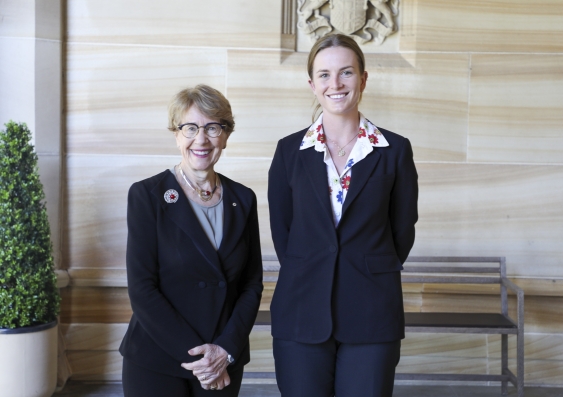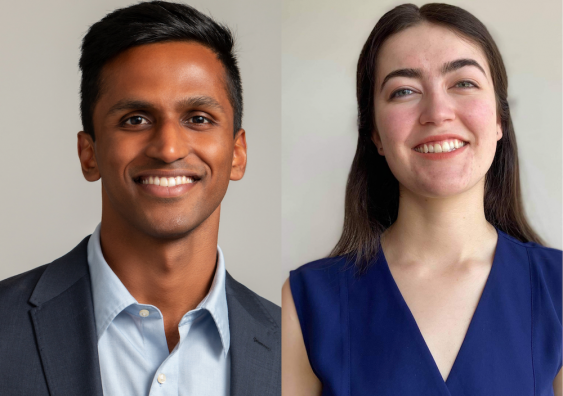UNSW law student awarded Rhodes Scholarship
2024-11-08T09:00:00+11:00

Corey Blyth plans to use the scholarship to study a Bachelor of Civil Laws and a Master of Public Policy.
Photo: David Fanner
Corey Blyth is the first Indigenous student at UNSW Law & Justice to receive a Rhodes Scholarship.��
UNSW Law & Justice student Corey Blyth has been awarded a 2025 Rhodes Scholarship to study at Oxford University.
Mr Blyth plans to use the prestigious scholarship to study a Bachelor of Civil Laws and a Master of Public Policy at the university. Both courses reflect his interests in advocacy and public law.��
“I have two career ambitions, which may evolve with time. The first is to advocate for the inclusion of a Mildren direction in NSW law, so that Indigenous witnesses with unique socio-linguistic qualities are less likely to be disadvantaged by the jury trial process,” he said.
“The second is to consider how to make the delivery of policies affecting Indigenous people more efficient, whilst also maintaining the necessary balance between self-determination and accountability.”
Mr Blyth said the process of becoming a Rhodes scholar has been a challenging but useful process that’s helped refine his career direction, and his plans to contribute to society.��
“It is a very exciting opportunity and is not something that I had anticipated would have been possible a few months ago,” he said.��
UNSW Vice-Chancellor and President Professor Attila Brungs, who studied inorganic chemistry at Oxford as a Rhodes Scholar, congratulated Mr Blyth.
“It is wonderful to see yet another UNSW student whose passion and desire to have a positive impact in the world has resulted in the opportunity of a Rhodes and study at Oxford. Corey’s determination, strong values and expert knowledge will no doubt see him make a significant contribution to the legal community and society more broadly. I wish him the very best,” Prof. Brungs said.
Mr Blyth will complete a Bachelor of Law (Honours) and Bachelor of Criminology and Criminal Justice at UNSW this year. He started his higher education journey in 2019 by participating in the Pre-Law Program run by the UNSW’s Centre for Indigenous Programs, Nura Gili.��
“The program helped me settle into UNSW and develop connections with fellow students and the faculty. It also introduced me to most of the content for the first two terms. That was important given I do not come from a legal background.”
Mr Blyth has been working in public law in various roles alongside his studies, including for the Office of the Director of Public Prosecutions, as a law tutor and formerly as a research assistant at the UNSW Centre for Criminology, Law and Justice.
“It has been a lot of work juggling both degrees with my other commitments. But what I am most pleased with is that I have been able to maintain consistent performance across the five years,” he said.��
Dean of UNSW Law & Justice, Professor Andrew Lynch, said UNSW was enormously proud of Mr Blyth.
“Not only is Corey an exceptional student, he is also the first Rhodes scholar to be a student of both of the faculty’s undergraduate programs – in law and criminology. Our entire community shares great pride in this achievement, and I have no doubt he will make the most of this wonderful opportunity,” he said.
Mr Blyth has encouraged aspiring lawyers to undertake professional work while studying.
“I chose to get involved in legal work quite early. I undertook summer clerkships in my first year of law studies, which is a lot earlier than most,” he said.
“That is something which I have been suggesting to other students as well. Get involved in the law as early as you can and gain experience while you are studying. It is important to help narrow your focus.”
He also thanked those who supported him during the application process, and congratulated the other Rhodes scholars-elect and the shortlisted candidates.��
“Everyone I met during the Rhodes process was remarkably talented, kind and selfless. I have no doubt they will all contribute hugely to this country,” he said.�� ��
Rhodes Scholars are chosen on the basis of exceptional intellect, character, leadership and commitment to service. Each year, about 100 scholars are selected from around 60 countries, including up to nine from Australia – one from each state, plus three Australia-at-Large awards.






